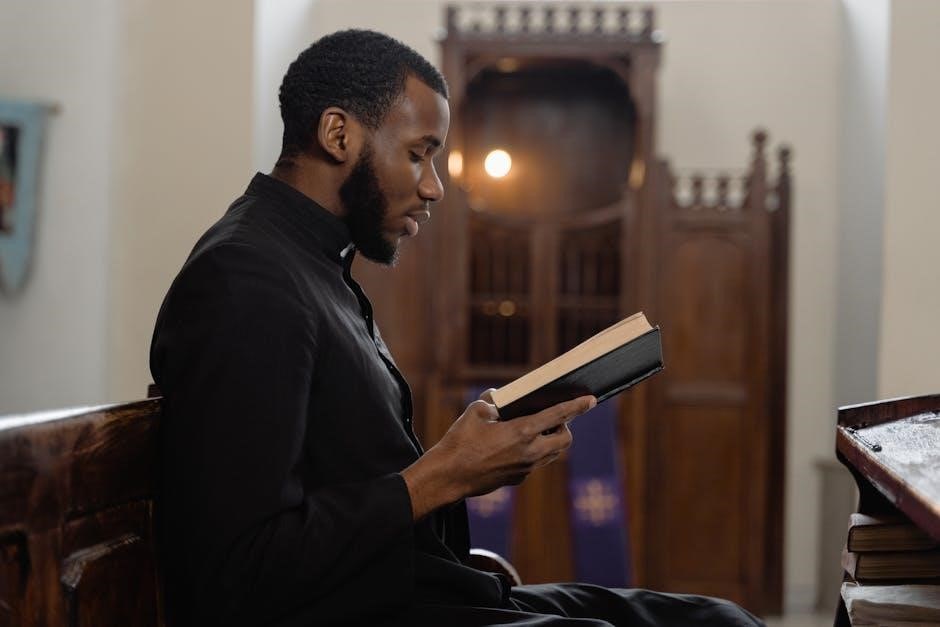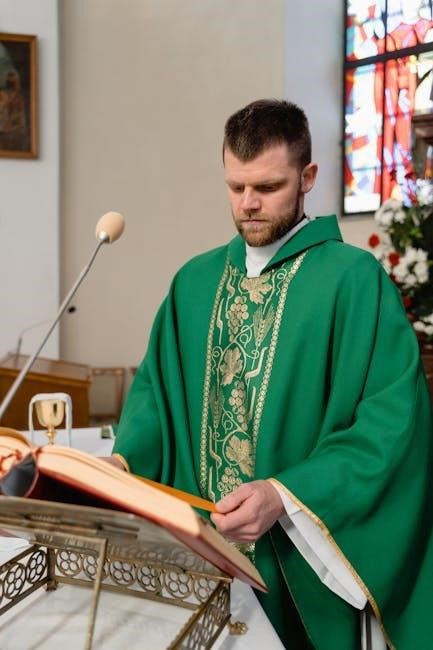1. Biblical Preaching and Teaching
A pastor’s core duty is to faithfully preach and teach the Word of God. This involves studying Scripture, preparing sermons, and delivering messages that are both biblically sound and relevant to the congregation’s lives. It is an essential part of their calling.

2. Shepherding the Flock
Shepherding the flock is a crucial duty, demanding pastors nurture and guide their congregation with compassion and care. Inspired by 1 Peter 5:2-3, this involves watching over them, not by force, but willingly, as God desires. Pastors must know their flock, understanding their individual needs and challenges, and offer support.
This includes providing guidance, protection, and encouragement to those under their care. A good shepherd leads by example, living a life that reflects the teachings of Christ. They foster a sense of community and belonging, ensuring that each member feels valued and supported in their spiritual journey.
Shepherding also includes protecting the flock from false teachings and harmful influences. Pastors must be vigilant in guarding the truth and equipping their members to discern between right and wrong. This duty goes beyond the pulpit, requiring active involvement in the lives of the congregation, offering pastoral care, and demonstrating genuine concern for their well-being.

3. Prayer and Intercession
Prayer and intercession form the bedrock of a pastor’s ministry. As spiritual leaders, pastors are called to dedicate themselves to consistent prayer, both personally and on behalf of their congregation. This involves not only personal communion with God, but also fervently interceding for the needs of others, lifting their burdens and concerns before the Lord.
Drawing from 1 Timothy 2:1-2, pastors should prioritize prayers for all people, including those in authority, that we may live peaceful and quiet lives in all godliness and holiness. This demonstrates a commitment to seeking God’s will and intervention in the lives of individuals, the church, and the wider community.
Through prayer, pastors gain wisdom, discernment, and strength to lead effectively. It is a vital source of guidance, empowering them to make sound decisions and navigate the challenges of ministry. By modeling a life of prayer, pastors inspire their congregation to cultivate their own relationship with God and embrace the power of intercession.
4. Providing Spiritual Counseling
Pastors are often called upon to provide spiritual counseling to members of their congregation. This involves offering guidance, support, and encouragement to individuals facing personal challenges, crises, or spiritual struggles. Drawing from James 5:14, pastors should be prepared to pray for and with those who are struggling, offering a listening ear and a compassionate heart.
Effective spiritual counseling requires empathy, discernment, and a solid understanding of biblical principles. Pastors must be able to listen attentively, identify the root causes of problems, and offer practical advice rooted in Scripture. They also need to know when to refer individuals to professional counselors or therapists for specialized assistance.
The goal of spiritual counseling is to help individuals grow in their faith, overcome obstacles, and find healing and wholeness in Christ. Pastors play a vital role in nurturing the spiritual well-being of their flock by providing a safe space for vulnerability, guidance, and prayerful support.
5. Leading Worship Services
A pastor leads worship services, creating an atmosphere for congregants to connect with God. This involves planning the order of service, giving sermons, leading prayers, and facilitating the sacraments. The pastor must create moments of worship that are relevant for all.
5.1. Music Selection and Leadership
Music plays a vital role in worship, and the pastor often guides the selection of songs and hymns. This involves choosing music that aligns with the service’s theme, engaging the congregation, and honoring God. The pastor may work with a music director or worship team to ensure a diverse and uplifting musical experience.
Effective music leadership requires sensitivity to the congregation’s preferences, musical styles, and theological understanding. The pastor should encourage the use of both traditional and contemporary music, creating a blended worship environment that appeals to a wide range of people. It’s important to select songs with meaningful lyrics that reflect biblical truths and inspire spiritual growth.
Furthermore, the pastor should foster a spirit of collaboration and teamwork within the music ministry. Providing guidance, support, and encouragement to the musicians and vocalists will help them to grow in their talents and use their gifts to lead the congregation in heartfelt worship. The goal is to create an atmosphere where people can connect with God through music and experience His presence in a tangible way.
6. Administration of Ordinances
Pastors are entrusted with administering church ordinances, such as baptism and the Lord’s Supper. These symbolic acts are essential expressions of faith and commitment within the Christian community, signifying spiritual cleansing, remembrance of Christ’s sacrifice, and unity among believers.
6.1. Baptism
Baptism, a sacred ordinance, symbolizes a believer’s identification with Christ’s death, burial, and resurrection. As administrators of this rite, pastors play a crucial role in guiding individuals through this significant step of faith. They ensure candidates understand the theological implications of baptism, emphasizing its connection to repentance, forgiveness of sins, and new life in Christ.
Pastors often conduct baptism classes or counseling sessions, explaining the meaning and purpose of baptism in detail. They address questions, clarify misconceptions, and help individuals prepare their hearts for this public declaration of faith. During the baptism service, pastors lead the congregation in celebrating the new believer’s commitment, offering prayers of blessing and encouragement.
The pastor’s role extends beyond the act of immersion. They also provide ongoing discipleship and support to newly baptized believers, helping them grow in their faith and integrate into the church community. By faithfully administering baptism, pastors uphold a vital tradition within the church, fostering spiritual growth and reinforcing the message of salvation through Jesus Christ.
6.2. Lord’s Supper
The Lord’s Supper, also known as Communion or Eucharist, is a central ordinance in the Christian faith, commemorating Christ’s sacrifice and fostering unity among believers. Pastors are entrusted with the solemn duty of administering this sacred meal, ensuring its proper observance and significance within the church community.
Preparation for the Lord’s Supper often involves the pastor leading the congregation in reflection and self-examination, encouraging individuals to confess their sins and reconcile with one another. During the service, the pastor recounts the events of the Last Supper, emphasizing the symbolism of the bread representing Christ’s body and the wine representing His blood, shed for the forgiveness of sins.
The pastor leads the congregation in partaking of the elements, reminding them of Christ’s sacrifice and their participation in His body, the church. Prayers of thanksgiving and remembrance are offered, and the service often concludes with a call to renewed commitment and service to Christ. By faithfully administering the Lord’s Supper, pastors help believers connect with the heart of their faith, fostering spiritual growth and strengthening the bonds of community.
7. Visitation and Outreach
Pastoral visitation and outreach are vital aspects of a pastor’s role, extending their ministry beyond the church walls and into the lives of individuals within the congregation and the wider community. These activities demonstrate care, compassion, and a genuine desire to connect with people on a personal level, offering support, encouragement, and spiritual guidance.
Visitation involves visiting members of the congregation in their homes, hospitals, or care facilities, providing a listening ear, offering prayers, and sharing words of comfort and hope. It allows pastors to build relationships, understand individual needs, and offer tailored support during times of joy, sorrow, or difficulty.
Outreach, on the other hand, focuses on reaching out to those who are not yet connected to the church, sharing the Gospel and inviting them into a relationship with Christ. This can involve participating in community events, volunteering in local organizations, or initiating evangelistic programs. By actively engaging in visitation and outreach, pastors fulfill the biblical mandate to care for the flock and spread the love of Christ to all.

8. Officiating at Weddings and Funerals
Officiating at weddings and funerals is a significant pastoral duty, marking life’s most profound transitions with sacred ceremonies. These events provide opportunities to offer spiritual guidance, comfort, and hope to individuals and families during times of both joy and grief.
Weddings are joyous occasions where a pastor guides couples in making vows before God and their community. The pastor crafts a meaningful ceremony, incorporating scripture, prayers, and personalized messages that reflect the couple’s unique relationship and commitment to Christian principles. They provide premarital counseling, preparing the couple for the challenges and joys of marriage.
Funerals, on the other hand, are somber events where a pastor offers solace and support to grieving families and friends. They conduct a service that honors the life of the deceased, shares memories, and proclaims the hope of eternal life through Christ. The pastor’s presence and words of comfort are invaluable during these difficult times.

9. Prioritizing Personal Spiritual Growth
A pastor’s effectiveness in ministry is directly linked to their own spiritual vitality. Prioritizing personal spiritual growth is not a luxury but a necessity for sustained and impactful leadership. A pastor must cultivate a deep and abiding relationship with God, nurturing their own soul so they can effectively shepherd others.
This involves consistent engagement in spiritual disciplines such as prayer, Bible study, and reflection. Pastors need to carve out dedicated time for personal devotions, seeking God’s guidance and wisdom for their lives and ministry. They should also prioritize attending retreats, conferences, and engaging with mentors for continued learning and spiritual development.
Furthermore, a pastor must be willing to address their own weaknesses and vulnerabilities, seeking accountability and support from trusted friends and counselors. Self-care is crucial to prevent burnout and maintain a healthy balance in life. By prioritizing their own spiritual growth, pastors can lead with authenticity, integrity, and a genuine love for God and His people.
10. Overseeing Church Administration
While a pastor’s primary focus is spiritual leadership, overseeing church administration is also a crucial duty. Effective administration ensures the church operates smoothly, efficiently, and in accordance with its mission and values. This involves providing direction for the church’s various ministries, managing finances responsibly, and ensuring legal compliance.
A pastor may delegate administrative tasks to qualified staff or volunteers, but they remain ultimately accountable for the church’s overall management. This includes setting goals, developing strategies, and monitoring progress. Pastors must also foster a culture of teamwork and collaboration, empowering others to use their gifts and talents in service to the church.
Furthermore, overseeing church administration requires strong communication skills, the ability to resolve conflicts, and a commitment to transparency and accountability. Pastors must be willing to make difficult decisions, address challenges, and adapt to changing circumstances. By effectively managing church administration, pastors can create a healthy and thriving environment where the gospel can flourish.
